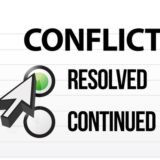Handling Workplace Conflicts
No matter where you work, you will end up dealing with some workplace conflicts. It’s just a fact of life that you will disagree with other people, and sometimes these disagreements will occur at work. While conflict isn’t fun to deal with, it’s important that you don’t ignore it. Instead, you should deal with it in a healthy way.
Workplace conflicts can come from a number of places: favoritism, opposing opinions, compensation problems, or just someone having a bad day. But many of these problems stem from two main areas: poor communication and heated emotions. Tension in the workplace can happen when communication is ineffective or emotions overtake reason in the decision-making process. And even when you have a happy and communicative team, conflicts can still happen. When they do, it’s important to deal with them well. To that end, we at Career Solutions Group have come up with three important steps to resolve workplace conflicts effectively and respectfully. Here they are:
- Communicate business expectations. Sometimes conflicts arise out of plain confusion. When people are uncertain what counts as “acceptable” behavior, or aren’t sure what their position encompasses, they might be more inclined to overstep unspoken bounds. Having an integrity statement for the business which emphasizes communication and collaboration. Additionally, explicitly outlining the expectations for behavior can go a long way towards preventing conflict from happening in the first place. Managers should also make sure that everyone knows what goes into their job description. If you or one of your coworkers are confused about what your position involves, be willing to ask your supervisor for clarification.
- Deal with conflict directly. When conflict does arise, dealing with it directly will help prevent hurt feelings and exacerbated tensions. Finding the root of the conflict and addressing it straight on will lead to quicker resolutions overall. Additionally, try and resolve potential areas of conflict before they begin. Lay out expectations, watch for areas of tension, and implement proactive solutions wherever possible.
- Consider importance. Sometimes, you will be the source of workplace conflict, and when you are, consider the importance of the thing which is causing issues. You have probably heard the phrase “pick you battles”; that certainly applies to workplace conflict. If you find that something at your job is making it difficult or impossible to work, then you might have to initiate conflict with that thing in order to get resolution. However, don’t start conflict for the sake of conflict. You’ll make your life more difficult, and you won’t be making any allies either.
Keep in mind that conflict can often lead to improvements when handled right. Try to be objective when dealing with conflict, and always keep in mind the situation of the other people involved. If you act with empathy and forthrightness, conflict resolution will come much faster and be less painful.
Career Solutions Group specializes in helping career changers find a career path to suit their needs. If you are interested in our services, or want to learn more, email us at info@careersolutionsgroup.net. We offer free initial consultations, and have helped hundreds of job seekers make successful transitions.
By: Julia Pillard, Career Solutions Group

